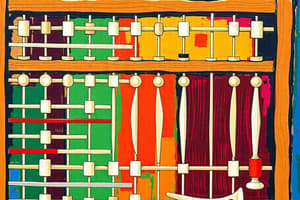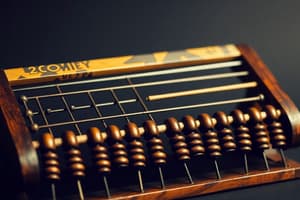Podcast
Questions and Answers
What was the primary function of Napier's bone?
What was the primary function of Napier's bone?
- Multiplication and division (correct)
- Calculating logarithms
- Addition and subtraction
- Square roots and exponents
Which invention is Blaise Pascal known for?
Which invention is Blaise Pascal known for?
- The slide rule
- The logarithm calculator
- The mechanical abacus
- The pascaline (correct)
Who is credited with the invention of the binary system used in modern calculators?
Who is credited with the invention of the binary system used in modern calculators?
- John Napier
- George Boole
- Gottfried Wilhelm von Leibniz (correct)
- William Oughtred
What limitation did the pascaline have according to the content?
What limitation did the pascaline have according to the content?
Which of the following tools was used for both addition and subtraction?
Which of the following tools was used for both addition and subtraction?
What is George Boole known for inventing?
What is George Boole known for inventing?
What significant contribution did Tashkent cleric Al'Khowarizmi make?
What significant contribution did Tashkent cleric Al'Khowarizmi make?
Which of the following tools is considered the first automating counting device?
Which of the following tools is considered the first automating counting device?
What was the primary function of the Difference Engine designed by Charles Babbage?
What was the primary function of the Difference Engine designed by Charles Babbage?
Who is known as the first programmer and documented Babbage's work?
Who is known as the first programmer and documented Babbage's work?
Which machine was built by Howard Aiken in 1944 based on Babbage’s original design?
Which machine was built by Howard Aiken in 1944 based on Babbage’s original design?
What technological advancement did Shockley and Bardeen develop?
What technological advancement did Shockley and Bardeen develop?
What was a significant feature of the Electronic Numerical Integrator and Computer (ENIAC)?
What was a significant feature of the Electronic Numerical Integrator and Computer (ENIAC)?
Which project did John von Neumann consult on that aimed to improve computer design?
Which project did John von Neumann consult on that aimed to improve computer design?
What was one of the primary uses of punched cards as developed by Herman Hollerith?
What was one of the primary uses of punched cards as developed by Herman Hollerith?
What was the purpose of the Analytical Engine designed by Babbage?
What was the purpose of the Analytical Engine designed by Babbage?
Flashcards are hidden until you start studying
Study Notes
Abacus and Early Calculation Devices
- The abacus, originating from China, is the first automated counting device, invented around 2,500 years ago for arithmetic operations.
- John Napier introduced Napier's Bone in 1617, a tool for multiplication and division, and is also credited with the invention of logarithms, simplifying multiplication into addition. Its use persisted in Europe until the mid-1960s.
Contributions to Computing and Algorithms
- Al-Khwarizmi, a cleric from Tashkent, authored a pivotal book on algorithms in the 12th century, laying the groundwork for modern software.
Mechanical Calculators and Early Innovators
- Blaise Pascal invented the Pascaline, the first mechanical calculator, at the age of 18. Created in 1643, it performed addition and subtraction using a gear system, though its complexity was exacerbated by the then non-decimal French currency.
- William Oughtred developed the slide calculator in 1630, a tool for addition and subtraction, independently resembling a similar invention by Delamain.
- Gottfried Wilhelm von Leibniz created the Stepped Reckoner, the first device for multiplication and division, though it suffered from reliability issues due to contemporary part accuracy. He also contributed to the documentation of the binary system.
Key Figures in Computer Science
- George Boole formulated Boolean algebra, foundational for logic systems in modern computing, utilizing symbols like < and > for inequalities.
- Charles Babbage designed the Difference Engine for automating polynomial calculations and the Analytical Engine, which was programmable using punch cards. However, he faced funding challenges that prevented construction of these machines.
- Ada Lovelace, known as one of the first female mathematicians and the first programmer, documented Babbage's work, creating an algorithm for the Difference Engine focused on Bernoulli numbers.
Important Developments in Computing Technology
- Herman Hollerith invented a punched-card tabulator for the 1890 U.S. Census, utilizing electricity for data processing, leading to the formation of the Tabulating Machine Company, which eventually became IBM, now a leading computer manufacturer.
- Alan Turing created the Turing machine, a theoretical model outlining problems solvable by computation. He also developed the Colossus, a computer designed to decrypt the German enigma code during WWII.
- Howard Aiken constructed the Harvard Mark I in 1944, based on Babbage's designs and operated using relays. Grace Hopper contributed as a programmer for this machine, capable of adding or subtracting 23-digit numbers in 0.3 seconds.
Evolution of Electronic Computers
- The Electronic Numerical Integrator and Computer (ENIAC) was the first electronic digital computer, reliant on vacuum tubes instead of electromechanical switches, lacking programs storage due to its wired circuitry.
- Shockley and Bardeen innovated the semiconductor, replacing vacuum tubes and enhancing the development of computers.
- John von Neumann consulted on the ENIAC project, contributing to the conceptual development of the EDVAC, which could store both programs and data, a principle foundational to almost all contemporary computers.
Studying That Suits You
Use AI to generate personalized quizzes and flashcards to suit your learning preferences.




